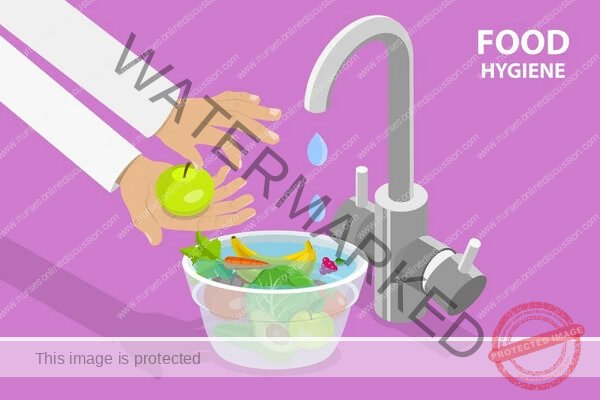Communicable Diseases
Subtopic:
Food Hygiene

Food hygiene covers all health-related practices, principles, and methods applied to ensure food is free from unwanted substances and agents that cause illness. Effective food hygiene is essential for stopping foodborne sicknesses, which are a major health challenge, especially in many developing nations.
Definitions
Food Hygiene: Refers to all health-focused actions, rules, and procedures established to make sure food is free from any source of contamination or disease-causing germs.
Food Safety: The techniques for managing, preparing, and storing food in ways that prevent getting sick or infected from it.
Key Considerations in Food Safety
Maintain Cleanliness: Ensure cleaning of areas and tools used for preparing and serving food.
Separate Raw and Cooked Foods: Prevent mixing by keeping uncooked and cooked items apart.
Cook Food Thoroughly: Heating food properly kills harmful germs.
Keep Food at Safe Temperatures: Store food at temperatures that limit germ growth.
Hand Washing: Always wash hands, particularly before handling food and after using the restroom.
Use Safe Water and Raw Materials: Make sure water and ingredients are safe and not contaminated.
Maintaining a Clean Environment and Utensils
Keep the food selling area and location clean; all work surfaces should be non-absorbent, simple to clean, and off the ground.
Selling locations should be located away from waste areas, toilets, uncovered drains, and animals.
Use lidded trash bins and empty them often.
Provide necessary facilities to promote hygiene, such as restrooms, handwashing spots, secure water access, and drainage.
Protect food from dust, flying insects, dirt, and direct sunlight.
Wash hands before touching food and frequently while preparing it.
Wash hands after using the toilet.
Clean and sanitize all surfaces and equipment used for preparing food.
Protect kitchen spaces and food from pests like flies, insects, and other animals.
Cooking Food Thoroughly
Cook food completely, especially items like meat, poultry, eggs, and seafood.
Bring liquid foods such as soups and stews to a boil to confirm they reach 70°C.
For meat and poultry, check that the liquids are clear, not pink.
Ideally, use a food thermometer to verify internal heat levels.
Reheat previously cooked food completely before serving again.
Proper cooking destroys nearly all harmful microorganisms.
Foods needing particular attention include ground meats, rolled meat roasts, large meat cuts, and whole birds.
Separating Raw and Cooked Foods
Keep raw meat, poultry, and seafood separate from other types of food.
Use distinct tools and equipment, such as knives and cutting boards, specifically for handling raw items.
Store food in containers to prevent raw items from touching prepared food.
Keeping Food at Safe Temperatures
Do not leave cooked food out at average room temperature for more than two hours.
Quickly refrigerate all cooked and easily spoiled food, preferably below 5°C.
Keep cooked food hot, over 60°C, before serving.
Avoid storing food for extended periods, even when refrigerated.
Microorganisms can multiply rapidly if food is stored at room temperature.
Maintaining food temperature below 5°C or above 60°C slows down or stops the growth of microorganisms.
Some dangerous microorganisms can still grow even below 5°C.
Using Safe Water and Raw Materials
Use water that is safe to drink or treat it to make it safe.
Choose food products that are fresh and healthy.
Select foods processed for safety, like pasteurized milk.
Wash fruits and vegetables, particularly if they will be eaten uncooked.
Do not use food past its expiration date.
Ingredients, including water and ice, can be contaminated by dangerous germs and chemicals.
Poisonous chemicals can form in food that is damaged or moldy.
Careful selection of ingredients and simple steps like washing and peeling can reduce or remove risks.
Related Topics
Disease Causation and Prevention
Disease Transmission Cycle
Levels of Disease Prevention
Introduction to Environmental Hygiene/Sanitation
Housing
Ventilation Heating and Lighting
Safe Water Supply
Food Hygiene
Sanitation
Get in Touch
(+256) 790 036 252
(+256) 748 324 644
Info@nursesonlinediscussion.com
Kampala ,Uganda
© 2025 Nurses online discussion. All Rights Reserved Design & Developed by Opensigma.co

